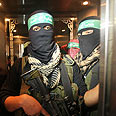
Palestinian heroes - Hamas men
Photo: Reuters
The newly announced Palestinian reconciliation agreement between Hamas and Fatah can be at least partially explained by politics surrounding the upcoming unilateral declaration of independence in September. It appears that Palestinian "president" Mahmoud Abbas and the Fatah leadership decided to concede to power-sharing with Hamas in order to present a unified front to the United Nations. They also recognized that the United States is now perceived as the weak horse in the Middle East, as demonstrated by its confused and ineffective responses to revolutions in Egypt, Syria and Yemen.
“Muqawama” or “resistance” is the core of Palestinian political and cultural identity. As Hamas official Mahmoud a-Zahar said, "Our program does not include negotiations with Israel or recognizing it. It will not be possible for the interim national government to participate or bet or work on the peace process with Israel."
But there is a deeper aspect to Palestinian reconciliation that flows not from the politics of the moment but from the core of Palestinian identity. In choosing reconciliation both Hamas and Fatah stated explicitly that peace between Palestinians is more important than peace with Israel. Recreating Palestinian unity, above all, preserves the possibility of resistance.
No Peace
Hamas makes its position clear: Group leader Haniyeh says Israeli presence 'on our land illegal, cannot be recognized.' Foreign Minister Lieberman urges Europe to adopt cautious approach to Palestinian unity deal
“Muqawama” is the defining concept for the Palestinian perception of themselves and their relationships with Jews and the British before them and it can be expressed in secular or religious terms. A literal translation of the acronym Hamas is "Movement of the Islamic Resistance," but the term is also used, for example, by the Marxist Popular Front for the Liberation of Palestine.
Indeed, “Muqawama” shapes the Palestinian perception of its very origins as a "nation," resisting the British and the Zionists in the late 19th and early 20th Century. Resistance is the overarching framework through which the Palestinians understand their own history, as a fundamentally righteous fight against outside enemies who they believe usurped their land and ended their unity as a people.
Muqawama is the core principle of Palestinian identity, around which is wrapped a variety of other images of the past and future. For those who left in 1948 and their children – and for a surprising number of Western acolytes – the romanticized dimensions of Palestinian identity are pictures of families sitting under the lemon tree contemplating the richness of a land without Jews. This is a sort of mirror image of the once frequently quoted “land without a people” and "desolate Palestine" imagery popularized by Lord Shaftesbury and Mark Twain in the 19th Century and repeated by some, but hardly all, early Zionists.
The pleasant and prosperous villages of Palestine before the British and the Jews is an idealized past to which some aspire to return. The resilience of Palestinians in retaining their identity in their dispersal is also touted as a form of resistance. But to judge from at least some Palestinian poets and writers, the heroic present can only be comprised of fighters willing to die to restore their honor.
Resistance means 'no' to peace
The heroic fedayyin and now the mujahideen and "martyrs" are the Palestinian idols promoted by Fatah and Hamas alike, not the successful technocrats and businessmen. It is the "martyrs" who have schools named after them and whose pictures bedeck public places. Resistance must continue until "victory."But Palestinian resistance cannot exist without unity. The past four years of Palestinian factional fighting have been a particularly notable interlude of disunity, which is theorized to have undermined the cause of resistance and its ultimate goal of driving out or destroying the Jews. In truth, however, disunity has been more of the norm for Palestinian politics.
The rise of the Islamist movements during the 1980s and 1990s was aimed in part to thwart the "secular" PLO and its halting efforts toward peace with Israel. Before that, the internal politics of the PLO were fractious and sometimes violent. And above all, there are the experiences of the failure of the war against the Jews in 1948 and the Great Revolt of 1936 to 1939, the latter of which collapsed into Palestinian internecine warfare.
Resistance explicitly means rejection of peace with Israel. And resistance is fundamentally the only path for redemption of Palestinian national honor, which was sullied by the success of the Zionist movement in creating Israel. Palestinian disunity is credited with undermining the inability to drive out the Jews, and spies, collaborators, ideological and religious deviation, and spiritual weakness are all blamed. The path to redemption of Palestinian national honor is clear: Unity and resistance.
What comes after unity and resistance, and even 'victory,' however, is unclear. Will the new Palestinian unity government aspire towards a nominally "secular" or resolutely Islamist state? How long can these issues, in effect the fundamental question of what "Palestine" is, be deferred? Probably not very long.
As the example of Hamas’ misrule in Gaza shows, once unleashed, Islamist pressures to ruthlessly reorder all spheres of life on strident religious principles are relentless. In fact, the small Salafi groups in Gaza have complained that Hamas does not go nearly far enough to produce a true Islamic society. The same dynamic has been played out in nearly every Muslim state where Islamists have been permitted to participate openly in the political process.
The contradictions between any sort of modern state and nearly every Islamist vision are already being played out, and we should fully expect these to be the undoing of the Fatah-Hamas rapprochement. Palestinian resistance will then continue in its disorganized and competitive forms until the next effort at reunification. Escaping this cycle requires a new center for Palestinian identity. What that might be is difficult to imagine.
Alex Joffe is a New York-based writer on international affairs. His website is alexanderjoffe.net
- Follow Ynetnews on Facebook















